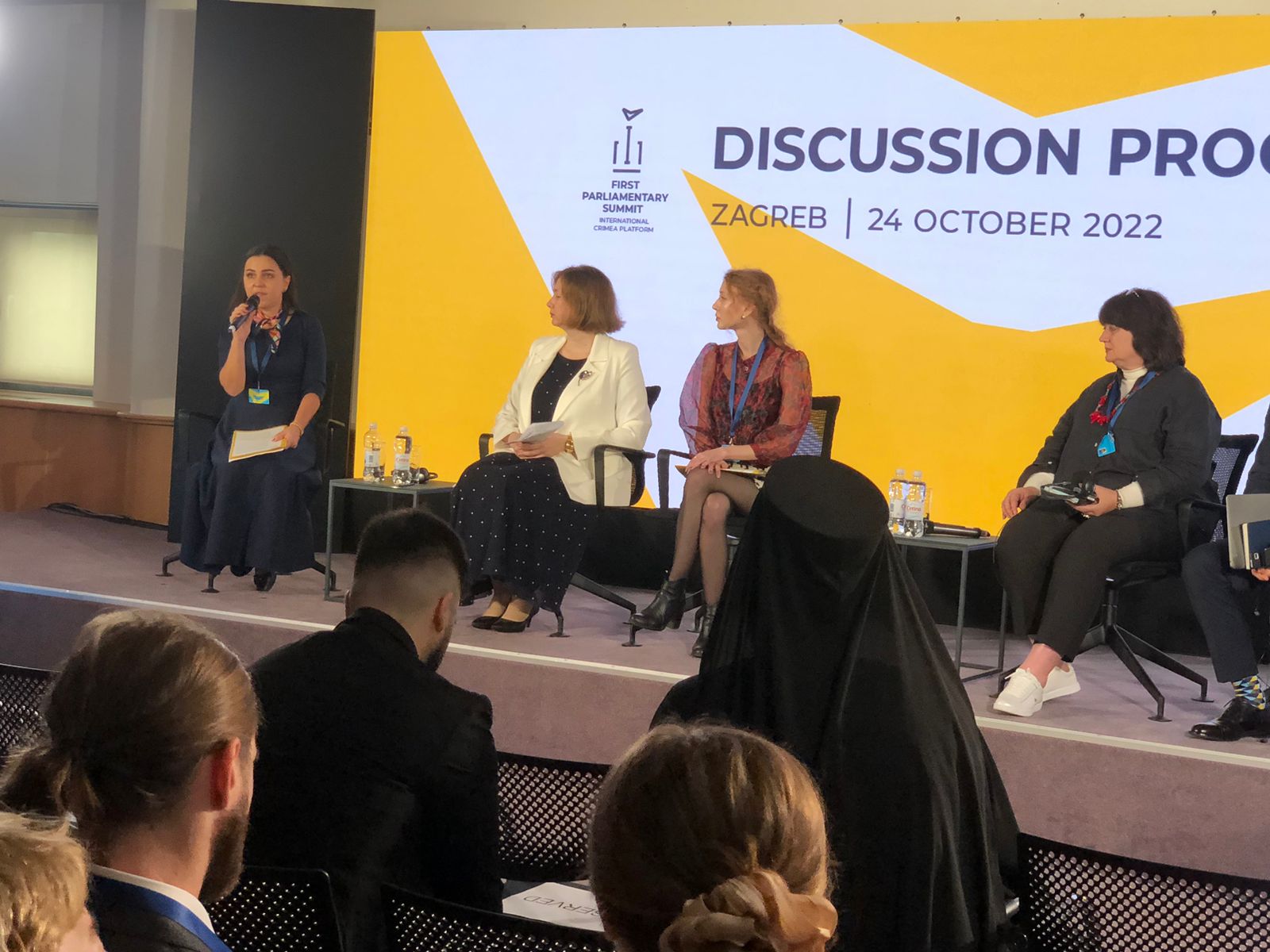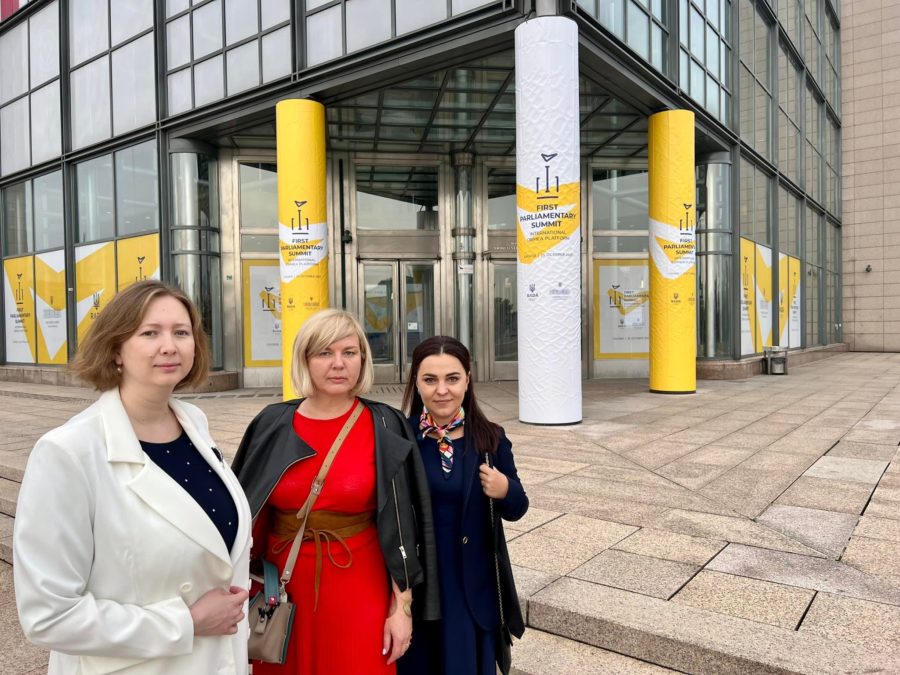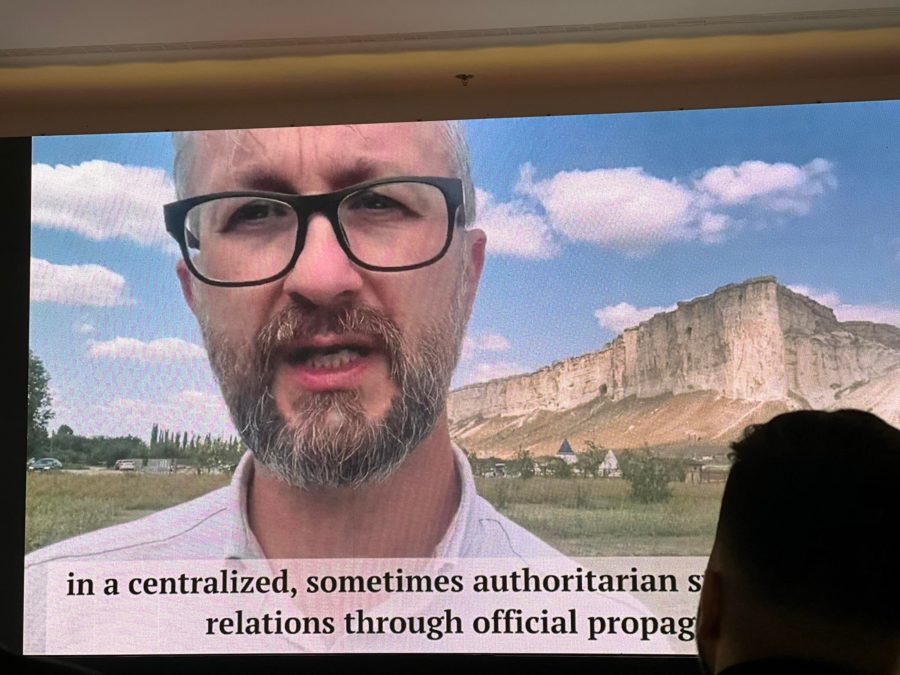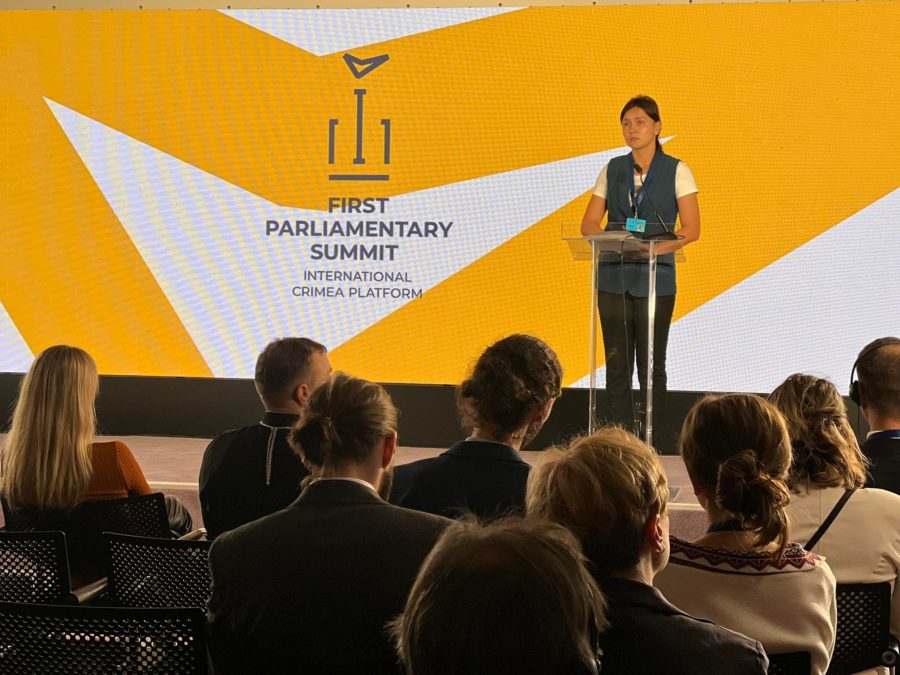First Parliamentary Summit of Crimea Platform starts in Zagreb
On October 24, 2022, the events of the First Parliamentary Summit of Crimea Platform, including an additional one-day offline program of meaningful discussions aimed at highlighting important issues related to occupied Crimean Peninsula, kicked off in Zagreb, Croatia.

The participants discussed the prospects of holding Russia and Russian officials to account for international crimes committed in occupied Crimea, the reintegration of Crimea after its de-occupation, the Croatian experience of territorial reintegration, and the possibility of its application in Ukrainian realities. Ukrainian officials and experts, as well as representatives of Croatian civil society and former government officials, took part in the discussion of these topics.
Panel discussions are organized by the Office of the Crimea Platform, established at the Representation of the President of Ukraine in the Autonomous Republic of Crimea, together with experts and NGOs that are members of the Crimea Platform Expert Network, primarily the Human Rights Centre ZMINA and the Crimean Human Rights Group, as well as Croatian human rights organizations.
The speakers of the Ukrainian and Croatian parliaments, Ruslan Stefanchuk and Gordan Jandroković, delivered opening remarks via video link.
The program started with the side event “Occupied Crimea & the renewed Russian invasion of Ukraine: New Human Rights Challenges”.
Since February 24, 2022, Russia has been using occupied Crimea as a springboard for a full-scale invasion of mainland Ukraine. For the peninsula, this means even greater isolation and a new wave of repression, particularly forced mobilization which has been ongoing on the occupied peninsula since September 21, 2022, and is targeted at representatives of the indigenous Crimean Tatar people.
“Since the beginning of Russia’s full-scale invasion of Ukraine, the human rights situation in Crimea has deteriorated dramatically. For the first time in the past few years, human rights defenders have recorded the practice of enforced disappearances of citizens on the peninsula, and victims of enforced disappearances are being brought to Crimea from the occupied part of Kherson region,” said Tetiana Pechonchyk, Head of the Board of the Human Rights Centre ZMINA, member of the Crimea Platform Expert Network.

Members of the Crimea Platform Expert Network Olha Skrypnyk, Alina Frolova, and Tetiana Pechonchyk (from left to right).
“For the past eight months, Crimea has remained in the shadows because more terrible events are taking place in the newly occupied regions of Ukraine where the Russian army is committing mass atrocities. But this does not mean that the human rights situation in Crimea remains stable. It has worsened significantly after February 24,” she added.
According to Tetiana Pechonchyk, the occupiers unlawfully hold people without providing access to a lawyer or informing their relatives.
“A lot of citizens fell victim to the practice of enforced disappearances. In particular, Yaroslav Zhuk, Serhiy Tsyhipa, Iryna Horobtsova, Ivan Kozlov, Mykola Petrovskyi, Maria Garcia Calatayud, Ruslan Abdurakhmanov, Appaz Kurtamet. However, no one can say for sure how many people are victims of enforced disappearances and are in prisons in occupied Crimea, as they are often held incommunicado,” Pechonchyk stressed.
In addition, she noted, the pressure on and persecution of independent lawyers and journalists on the occupied peninsula has increased significantly. In particular, four Crimean Tatar lawyers were detained in Crimea in May and later were sentenced to fines and administrative arrests, namely: Edem Semedliayev, Nazim Sheikhmambetov, Ayder Azamatov, and Emine Avamileva. Three lawyers – Lilia Hemedzhi, Rustem Kiamilev, and Nazim Sheikhmambetov – were deprived of their lawyer status and the possibility to continue their legal practice.
“So now it is increasingly difficult to find new lawyers who can defend our citizens in Crimea,” the human rights activist explained.
She also reported on the continued persecution of journalists in Crimea: “As of now, at least 14 people – professional and citizen journalists – are political prisoners and are held in penal facilities. Two of them – Iryna Danilovych and Vilen Temeryanov who cooperated with the Crimean Solidarity initiative – were imprisoned after February 24.”
According to Human Rights Centre ZMINA data, more than 150 Ukrainian citizens are political prisoners who are either in the territory of the occupied Crimea or were transferred to penal facilities in the territory of the Russian Federation, while three dozen of these people were imprisoned already after the third wave of Russian aggression against Ukraine.
Tetiana Pechonchyk emphasized that human rights defenders had been using all possible legal mechanisms to protect human rights in occupied Crimea for many years.
“It has long been obvious to us that only the de-occupation of the Crimean Peninsula will allow us to bring rule of law and human rights back there. That is why the Crimea Platform, uniting now half a hundred countries, is the most effective tool for us to free political prisoners and restore human rights in the occupied Crimean Peninsula,” she added.
The side event also touched upon the persecution of the Crimean Tatar people, the genocidal practices of the Russian Federation in occupied Crimea, the implementation of the “Crimean scenario” in the newly occupied territories of Ukraine, as well as Russia’s use of education as a tool to destroy Ukrainian identity and militarize the youth in the occupied territories of Ukraine.
Valentyna Potapova, Head of the Civic Education Center “Almenda”, Kateryna Rashevska, Head of the Regional Center for Human Rights, Olha Skrypnyk, Head of the Board of the Crimean Human Rights Group, and Eskender Bariyev, Head of the Crimean Tatar Resource Center, highlighted these topics. The event was moderated by Dave Elseroad, Head of Advocacy at the Human Rights House Foundation.
The presentation of the photo exhibition “Stories from Occupied Crimea” prepared by ZMINA was also held on the first day of the Summit.
A special event was the screening of a documentary dedicated to political prisoner Nariman Dzhelyal.
The documentary is dedicated to the story of Nariman Dzhelyal, a Crimean Tatar activist, political scientist, journalist, and first deputy chairman of the Mejlis of the Crimean Tatar People, who was detained in early autumn 2021 after his outright participation in the inaugural summit of the Crimea Platform in Kyiv. The occupation court is still holding Dzhelyal and the Akhmetov brothers in custody. Nariman’s wife and four children are waiting for him at home.

The documentary, based on interviews with relatives, friends, like-minded people, and lawyers of Nariman, describes his story through the lens of Russia’s political persecution of Ukrainian citizens in occupied Crimea. Currently, it is the Crimeans who are the overwhelming majority of the victims of the occupation regime.
Deputy Speaker of the Verkhovna Rada of Ukraine Olena Kondratiuk, documentary director Anna Tsyhyma, and Kateryna Yesypenko, the wife of Vladyslav Yesypenko, a political prisoner and a journalist of the RFE/RL’s Crimea Realities project, delivered speeches during the documentary discussion.

The detailed program of the first day of the Summit is here.
The Summit events are broadcast live on the Facebook pages of the Crimea Platform, the Representation of the President of Ukraine in the Autonomous Republic of Crimea, and the Human Rights Centre ZMINA.
The main official day of the Parliamentary Summit of the Crimea Platform is scheduled for October 25. Delegations from more than 50 countries and international organizations are invited to the Summit. In total, about 400 politicians from all over the world are expected to participate: representatives of parliamentary assemblies, international organizations, the European Parliament, the USA, Croatia, the UK, Latvia, Estonia, Lithuania, the Czech Republic, Poland, Germany, Turkey, Sweden, Canada, and Japan. Ukraine also invited countries that are not members of the Crimea Platform, in particular those of South America, Africa, and Asia.
The main program of the Summit — the plenary session — will begin with a video address by President of Ukraine Volodymyr Zelensky. The delegation of the Verkhovna Rada of Ukraine will be led by Speaker Ruslan Stefanchuk. The participants will adopt a Joint Statement following the Summit. More than 200 accredited media persons will cover the First Parliamentary Summit.
Photo credit: Alisa Timchenko, Tetiana Pechonchyk
If you have found a spelling error, please, notify us by selecting that text and pressing Ctrl+Enter.















